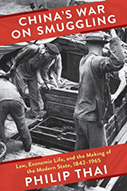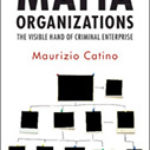China’s War On Smuggling: Law, Economic Life, And The Making Of The Modern State, 1842-1965

Author: Philip Thai
Publisher: New York: Columbia University Press, 2018. 408p.
Reviewer: Qingfei Yin | September 2019
During the second half of the nineteenth century, the authority and imperial control of the Qing central government declined significantly due to foreign encroachment and internal rebellions. Successive regimes taking power in China after the collapse of Qing, therefore, strived to fulfill the daunting task of rebuilding a strong state. Philip Thai, assistant professor of history at Northeastern University, presents a remarkable history of the Chinese state’s war against coastal smuggling from the mid-nineteenth through the mid-twentieth centuries. Thai places the conflict against a larger background of how state power grew and solidified in modern China and argues that anti-smuggling was “a transformative agent in expanding state capacity, centralizing legal authority, and increasing government reach over economic life.” (p. 3)
China’s War on Smuggling should be of great interest to legal historians. Thai adroitly traces the changes in the definition and criminalization of smuggling in modern China and demonstrates the fuzziness of the distinction between legality and illegality. Forcefully drawn into an international system of free trade imperialism, the Qing government had to narrow down the definition of smuggling to the trafficking of a handful of contrabands. The Nationalist government saw close links between “tariff, statecraft, sovereignty, and nationhood” (p. 88) and perceived a “smuggling crisis” (p. 87) in coastal China. Therefore, it launched a war against smuggling after regaining tariff autonomy in 1928. By expanding the definition of illegal trade and constructing a pervasive legal system, the “state creat[ed] the very crime it was combating.” (p. 118) During the Second Sino-Japanese War, the line between illegal and legal trade became blurrier as trading with the enemy was sometimes tacitly permitted or even actively encouraged due to material shortage. After the Communists assumed power, they further criminalized all “uncontrolled trade” (p. 244) as smuggling. Therefore, smuggling is not a given phenomenon but a crime created by a state determined to intervene in economic life. Moreover, Thai’s work shows that lawmaking and enforcement in modern China were highly politicized. In an era of high modernism and nationalism, enhancing national welfare and resisting foreign pressure necessitated building a strong central state capable of intervening in foreign trade.
Historians of modern China should also find China’s War on Smuggling a valuable addition to existing scholarship on the century of war and revolution since the mid-nineteenth century. First, the book challenges the revolution-centered narrative of modern China by highlighting the continuities in state-building in the late Qing, the Republic, and the People’s Republic. 1911 and 1949, therefore, were not ruptures in Chinese history; instead, they marked the gradual extension of state authority into new spaces. Second, Thai challenges the state-centered discourse by examining how consumers, merchants, and even officials resisted the state’s restriction and taxation on commerce. The social response to the state’s war on smuggling, especially people’s various strategies to evade the state, underscores the resilience of long existing trade networks along coastal China. State-building in modern China was not a linear process. Third, China’s War on Smuggling decenters agricultural China while focusing on maritime China, an area maintaining close connections with the global markets. Studying the experience of maritime China is crucial to our understanding of the interactions between China and the world during the modern era.
To sum up, Philip Thai uses the tug of war between the Chinese state and the smugglers to examine the retreat and expansion of state authority, a crucial process in the development of modern China. It also touches upon some broader topics such as state-society relations, the proper role of the state in the economy, and the impact of war on society. Therefore, it should be able to attract audiences outside the fields of Chinese history and criminal justice as well.
Qingfei Yin, Virginia Military Institute


